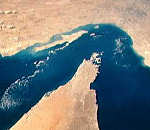
ABOVE: Strait of Hormuz
Some excellent reporting by Eric Lipton in an article in today’s New York Times suggests that the UAE is mostly giving lip service to export control.
Yousef al-Otaiba, an adviser to the crown prince of the United Arab Emirates, said his country was more closely monitoring goods that it re-exported while blocking items that might help Iran build weapons systems. But trade experts and Iranian traders in Dubai said there was little evidence that the new export control law was being broadly enforced.
“It has virtually had no effect, to be honest,†said Nasser Hashempour, deputy president of the Iranian Business Council in Dubai. “If someone wants to move something — get it to Iran — it is easy to be done.â€
Both Commerce and State have a more optimistic assessment, but, sadly, any proof of this was classified:
At the Commerce and State Departments, officials said they were encouraged by actions the Emirates had taken in some recent cases — the details of which are classified — that relied on their new authority under the export law. But they said an export licensing system must still be introduced and other enforcement steps taken.
Even so, Lipton quotes interviews with business in the UAE claiming that it’s business as usual with Iran:
S. M. Mir Ebrhimi, chief executive of Reza Nezam Trading, which operates mostly out of Iran, said he continued sending products with American-made components as usual. Mohammad Kazem, supervisor at Al Musafer Tourism and Cargo, said he had not even known his business was on the warning list. He said that the company followed the law, disputing any suggestion by American authorities that he had shipped prohibited items to Iran. He also said that he had seen no more inspections or spot checks by Emirati authorities.
(Full disclosure: Eric Lipton interviewed me in connection with the article, which includes a quote from me)
 Permalink
Permalink
Copyright © 2008 Clif Burns. All Rights Reserved.
(No republication, syndication or use permitted without my consent.)

 Posted by
Posted by  Category:
Category: 

